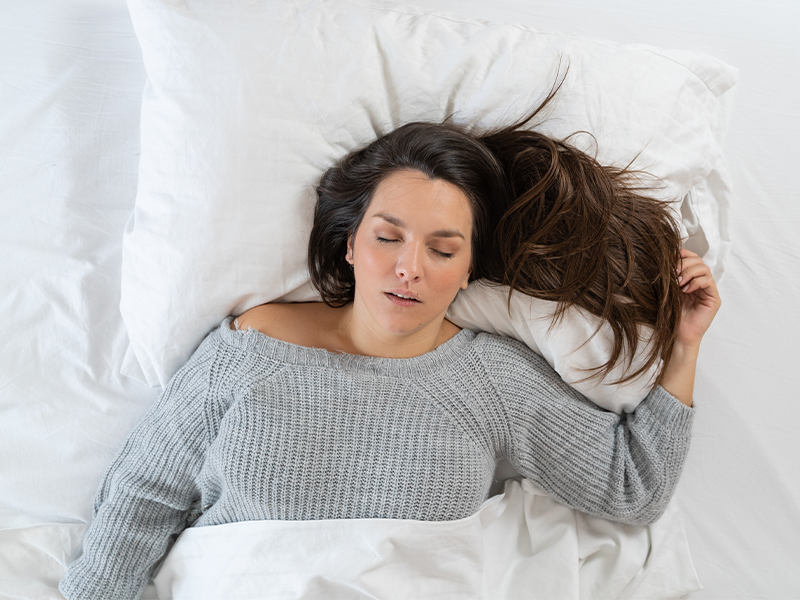We all know how important a good night’s sleep is for our overall health, but did you know that the amount and quality of sleep you get can significantly impact your eating habits?
Do you find that the longer you stay up, the more you check what’s in the cupboards or fridge for a quick snack?
Do you notice that when you get a good night’s sleep, you tend to have a healthier relationship with food during the day?
You’re not alone.
If you want to change your eating habits and health goals or improve your sleep, you will learn how closely interlinked sleep and eating are to help you achieve your goals.
Well, if you aren’t clear on the connection between sleeping and eating, by the end of this article, you will have an in-depth understanding of how sleep can influence what you eat. You also learn more about how sleep can either; throw you off your health/weight goals or contribute towards you achieving them.
Sleep deprivation is common and can lead to unhealthy eating habits, so we want to help you avoid that struggle or help you if you’re currently going through it,
Modern-day living in many countries worldwide do not embrace and promote the necessity for good sleep. In many societies, money has been a focal point, and people find themselves having to work many hours during a week and struggle to get adequate rest and sleep. However, people need to get a good, healthy sleep pattern in place.
By getting better sleep, it can help you to make healthier food choices. With a better understanding of how sleep affects your eating, you can make more informed decisions about your diet.
So, let’s begin this journey to understand the power of sleep and how it influences your eating habits…
Why is sleep so important?
Sleep is essential for good health and optimal well-being. While it’s good to focus on your diet and exercise for better health, sleep is a significant factor that heavily contributes to your health. It’s important to note that your diet and exercise are often impacted by sleep.
Getting enough sleep is essential for maintaining optimal health and well-being. Like exercise and a balanced diet, sleep may help prevent various health issues, including heart disease and depression.
Research has shown that adequate sleep helps to improve memory and learning, increase attention and creativity, and aid in making decisions. Good sleep also improves your brain performance, mood, and health.
According to sleep expert Dr. Marishka Brown, there are three major things that constitute you having a healthy sleep.
“One is how much sleep you get. Another is sleep quality — that you get uninterrupted and refreshing sleep. The last is a consistent sleep schedule.” she told News In Health,
Here’s a list of the many benefits health professionals claim you get from healthy sleep;
- Improves your attention and concentration
- Improves your memory
- Ability to maintain good relationships
- Keeps your heart healthy
- Improves your performance
- Improves your cognition
- Helps you maintain a healthy weight
- Strengthens your immune system
- Reduce your stress levels
Are you a gym-goer or athlete, or do you have an exercise regime?
You would be surprised how much sleep is important for people participating in sport, as the body makes a lot of recoveries and heals during that time.
The benefits of healthy sleep for people who exercise include;
- Better endurance
- More energy
- Improved accuracy and reaction time
- Faster speed
- Enhanced mental functioning
- Lowers heart disease
- Prevents depression
- Lowers inflammation
- Improves immune system
What are the effects of sleep on your eating habits
Sleep can profoundly affect your eating habits, both in the short and long term. When you don’t get enough sleep, your body’s hunger hormones become unbalanced, and you may crave sugary, fatty, or salty foods.
This is due to your body trying to make up for the energy it lacks if you’re experiencing sleep deprivation. In the long term, poor sleep can lead to serious health issues such as obesity, diabetes, and heart disease.

In addition, sleep can also affect your mental health. When you are sleep deprived, it can be difficult to control your emotions and impulses, which can lead to emotional eating (when people use food as a way to deal with feelings instead of to satisfy hunger). This can be particularly problematic if you already struggle with an eating disorder. It’s important to get enough sleep in order to maintain a healthy relationship with food.
When you don’t get enough sleep, your body produces more of the hormone ghrelin, which increases your appetite and cravings for unhealthy foods.
Furthermore, your body produces less of the hormone leptin, which helps to regulate your appetite and feelings of fullness. This leads to overeating and can lead to weight gain.
Additionally, when you are sleep deprived, it can be difficult to make healthy food choices.
Your ability to control your impulses and make rational decisions is impaired, so you may turn to unhealthy comfort foods as a way to cope with stress and fatigue. This can quickly spiral into an unhealthy eating pattern.
How can you use sleep to your advantage to make healthier food choices?
The good news is that getting a good night’s sleep can help you make healthier food choices.
When you are well-rested, your body produces more leptin, which helps to suppress your appetite and makes you feel fuller for longer. This can help you avoid unhealthy cravings and make sticking to a healthy diet easier.
In addition, getting enough sleep can help you make better decisions about food. When you are well-rested, you can better control your impulses and emotions, which can help you make healthier food choices.
You’ll also be better able to resist the temptation of unhealthy foods, as you’ll be less likely to seek out comfort foods when your body and mind are functioning optimally.
A good diet, regular exercise, and sufficient sleep all contribute to a healthy life.
How much sleep do I need?
The amount of sleep a person needs is tailored to the individual and their lifestyle. Sleep needs vary from person to person, mostly depending on their age and lifestyle.
There are many common myths and misunderstandings about sleep and how much sleep a person needs. One example is that adults need less sleep as they get older. This is not correct, as older adults still need the same amount of sleep.
However, sleep quality can get worse as you get older, especially if you have many responsibilities. Older adults are also more likely to take medications that can mess with their sleeping patterns and cause them not to get adequate sleep.
Another sleep myth is that you can “catch up” on your days off. Researchers are finding that this largely isn’t the case.
According to the Centers for Disease Control and Prevention (CDC) there are general guidelines for the amount of sleep different age groups should get. Here’s the breakdown:
- Newborns (0–3 months): 14–17 hours
- Infants (4–12 months): 12–16 hours
- Toddler (1–2 years): 11–14 hours
- Preschool (3–5 years): 10–13 hours
- School-age (6–12 years): 9–12 hours
- Teen (13–18 years): 8–10 hours
- Adult (18–60 years): 7-plus hours
- Adult (61–64 years): 7–9 hours
- Adult (65+ years): 7–8 hours
Although these are general guidelines, keep in mind that sleep needs can still vary, even for those within the same age group.
While you might need at least 8 hours of sleep a night to feel fully rested, your partner may wake up after 6 hours and feel perked up and well rested.
How do you know if you get enough sleep
A way to measure if you need more sleep is by asking yourself these questions;
- Do I feel rested after 8 hours of sleep, or need at least 9 or 10?
- Do I get sleepy during the day?
- Do I rely on caffeine to keep me going during the day?
- Has my sleeping partner noticed me moving around too much or having any sleep issues during the night?
Try to become conscious of how your mind and body are reacting to your sleep from how you feel during the day. Also, you can ask your sleep partner if they’ve noticed anything particular about you while sleeping.
As well as the number of hours, the quality of sleep is essential in getting a good rest.
How do you manage sleep deprivation?
If you are already sleep deprived, there are a few things you can do to help you get back on track. First, limit your exposure to blue light, which can interfere with your body’s sleep cycle.

Additionally, try to incorporate more relaxing activities into your daily routine, such as yoga or meditation, as this can help reduce your stress levels and make it easier to fall asleep.
Finally, if you are having trouble sleeping, try taking a warm bath or shower before bed as this can help your body to relax and prepare for sleep. Additionally, it’s important to ensure you are getting enough physical activity during the day, as this can help you sleep better at night.
Other tips for managing insomnia or lack of sleep include:
- Limit caffeine intake
- Don’t rely on sugar for an energy boost
- Take necessary breaks throughout the day
- Simplify your plans for the day
- Avoid driving
- Don’t sleep for too long in one period; try to regulate your sleeping pattern.
What are the downsides of not getting good sleep?
Signs of poor sleep include:
- Waking in the middle of the night
- Still not feeling rested after an adequate number of hours of sleep
- Sleep disruption may affect memory processing and formation.
- People’s performance at work, school, and other settings is affected by sleep disruption.
- Lacking focus, emotional reactivity, decision-making, risk-taking, behavior, and judgment
- Stress hormones increase
- Affects cognition function
- Excessive drowsiness
- Irritability
- Frequent yawning
- Extreme daytime fatigue
Chronic poor-quality sleep can interfere with your body’s internal systems and cause more complex effects than those signs and symptoms listed above.
What are the long-term consequences of poor sleep on your eating habits?
The long-term consequences of poor sleep on your eating habits can be serious. Chronic poor sleep quality can lead to serious health issues such as obesity, diabetes, and heart disease.
Additionally, it can lead to an increased risk of developing an eating disorder, as sleep deprivation can make it harder to regulate your emotions and impulses.
Furthermore, chronic sleep deprivation can also increase your risk of developing depression. This can lead to emotional eating, which can quickly spiral out of control and cause serious damage to your health.

Researchers suggested sleep deprivation is associated with higher levels of ghrelin (the hunger hormone), salt retention and inflammatory markers. They also noted that decreased sleep increases fatigue, which may affect a person’s desire or ability to exercise and maintain a healthful lifestyle.
Similarly to gaining weight, evidence suggests that getting a healthy sleep can help a person’s body take in fewer calories.
In 2022, a clinical trial found that overweight adults who increased their sleep duration took in fewer calories than a control group.
The adults increased their sleep by 1.2 hours on average, taking in around 270 calories fewer than the control group. Researchers who worked on that same trial also suggested that improving and maintaining healthy sleep duration could help weight loss and prevent obesity.
In essence, long-term lack of sleep has been closely associated with;
- Hypertension
- heart attacks and strokes
- Obesity
- Diabetes
- Depression and anxiety
- Decreased brain function
- Memory loss
- Weakened immune system
- Lower fertility rates
- Psychiatric disorders
Tips to improve your sleep
If you struggle to get enough sleep, several tips can help you improve your sleep habits.
First, make sure you build up time to take part in calming activities before going to your bedroom – it always helps if you’re sleepy before getting into bed. You should avoid caffeine and alcohol close to bedtime, which can disrupt your sleep cycle.
Secondly, ensure that your bedroom is dark, quiet and peaceful, as this will help your body to relax and fall asleep more easily. Be sure to limit the amount of time you spend looking at screens before bed, as the blue light from screens can disrupt your body’s production of melatonin, the hormone that helps you fall asleep.
Limiting the number of digital devices, such as TVs, phones, tablets, laptops and computers, can also help you avoid absent-minded scrolling.
It’s important to note that your sleep routine starts before you get into bed, so build time every evening to calm your body and mind. Try to engage in less stimulating activities such as; reading, gentle stretches or meditation.
If you can create a routine where you go to your bedroom, wind down and go to bed around the same time each day, it will really help create a pattern.
Ultimately, you should try to stick to a consistent sleep schedule, as this will help your body to adjust to a regular sleep pattern.
Shortly put, here are the main things you should be doing to improve your sleep:
- Get into a daily routine
- Manage your worries
- Prepare your body for sleep
- Create a restful environment
- Confront sleeplessness
- Stick to a sleep schedule
- Pay attention to what you eat and drink
- Limit daytime naps
- Include physical activity
- Restrict the use of electronic devices at night
- Avoid large meals, caffeine, and alcohol before bedtime
Sleep is an essential part of our overall health, and the quality of our sleep can significantly impact our eating habits. Poor sleep can lead to unhealthy cravings and overeating, while good sleep can help us make healthier food choices.
It’s important to get enough sleep in order to maintain a healthy relationship with food.
What else to do to improve your sleep
If you’re struggling with maintaining your weight due to bad sleeping habits, PhenQ PM is a natural weight-regulating formula that optimizes all three stages of night-time fat-burning.
PhenQ PM helps you melt excess pounds, crush hunger cravings, and reboot your metabolism — all while you sleep.
The pill can help you to:
- Torch fat while you sleep
- Fight hunger cravings
- Kickstart a slower metabolism
- Contribute to getting you 7-9 hours of deep sleep
With PhenQ PM, you can burn fat while you sleep. The more you sleep, the faster you burn that extra weight stuck around your arms, thighs, and belly while taking PhenQ PM.
Within the product, an increasing human growth hormone burns more calories and increases muscle growth. This is a major benefit to those who want to keep a lean physique while shedding calories.
PhenQ PM also helps to decrease excess cortisol levels, supporting your body’s natural fat-melting process. It also assists the fat cells in letting go of the fat stuck inside them.
By incorporating the tips outlined in this article, you can ensure you get the rest and sleep you need to make informed decisions about your diet, health and overall well-being.




